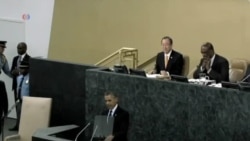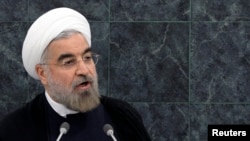UNITED NATIONS —
U.S. President Barack Obama has told the U.N. General Assembly he is willing to explore a thaw in relations with Iran, while urging consequences for Syria if it does not comply with a deal banning its chemical weapons. Obama shared some of the spotlight Tuesday with Iran’s new president, Hassan Rouhani, who said his country is ready to engage in serious talks about its nuclear program.
Obama led off the annual debate, saying on the foreign policy front he would use his remaining years in office to pursue two particular issues.
"Iran’s pursuit of nuclear weapons and the Arab-Israeli conflict," he said. "While these issues are not the cause of all the region’s problems, they have been a major source of instability for far too long, and resolving them can help serve as a foundation for a broader peace.”
On the Iran issue, he added that the United States is not seeking regime change in Tehran, and that it respects the right of the Iranian people to access peaceful nuclear energy. But he added that distrust of Iran has “deep roots” and cannot be overcome quickly.
“But I do believe that if we can resolve the issue of Iran’s nuclear program, that can serve as a major step down a long road towards a different relationship - one based on mutual interests and mutual respect,” said Obama.
On the crisis in Syria, where more than 100,000 people have been killed, Obama said a U.S.-Russian deal to eliminate the government’s chemical weapons arsenal should energize efforts to find a political settlement to the conflict.
Obama shared some of the spotlight with new Iranian President Hassan Rouhani. Rouhani has portrayed himself as more moderate than hardline predecessor Mahmoud Ahmadinejad.
He said Iran is ready to immediately hold “time bound and results-oriented talks” to build mutual confidence about its suspect nuclear program.
“Our national interests make it imperative we remove any and all reasonable concerns about our peaceful nuclear program,” Rouhani said.
He also criticized international sanctions against Iran, saying they only hurt regular people, not the state.
But after indicating he wants improved relations with the West, an anticipated encounter between Rouhani and Obama did not take place on the sidelines of the General Assembly. A U.S. official said the Iranians felt it would be too difficult for them at this stage.
Syria figured prominently in the remarks of other leaders, including Jordan’s King Abdullah. Jordan hosts nearly one million Syrian refugees and is struggling under that burden.
“These are not just numbers; they are people who need food, water, shelter, sanitation, electricity, health care and more,” said Abdullah.
From Africa, Nigerian President Goodluck Jonathan expressed concern about terrorism in the region, including the attack on a shopping mall in Kenya. He said piracy is another menace to the continent.
Brazil’s president, Dilma Rousseff, used much of her speech to chastise the United States for recent disclosures that it has spied on her government's internal communications. She said the right to security of a country’s citizens can never be ensured by violating the human and civil rights of another nation's people.
On Wednesday, the speeches continue, as do a number of high-level meetings on issues from Syria to the Central African Republic.
Obama led off the annual debate, saying on the foreign policy front he would use his remaining years in office to pursue two particular issues.
"Iran’s pursuit of nuclear weapons and the Arab-Israeli conflict," he said. "While these issues are not the cause of all the region’s problems, they have been a major source of instability for far too long, and resolving them can help serve as a foundation for a broader peace.”
On the Iran issue, he added that the United States is not seeking regime change in Tehran, and that it respects the right of the Iranian people to access peaceful nuclear energy. But he added that distrust of Iran has “deep roots” and cannot be overcome quickly.
“But I do believe that if we can resolve the issue of Iran’s nuclear program, that can serve as a major step down a long road towards a different relationship - one based on mutual interests and mutual respect,” said Obama.
On the crisis in Syria, where more than 100,000 people have been killed, Obama said a U.S.-Russian deal to eliminate the government’s chemical weapons arsenal should energize efforts to find a political settlement to the conflict.
Obama shared some of the spotlight with new Iranian President Hassan Rouhani. Rouhani has portrayed himself as more moderate than hardline predecessor Mahmoud Ahmadinejad.
He said Iran is ready to immediately hold “time bound and results-oriented talks” to build mutual confidence about its suspect nuclear program.
“Our national interests make it imperative we remove any and all reasonable concerns about our peaceful nuclear program,” Rouhani said.
He also criticized international sanctions against Iran, saying they only hurt regular people, not the state.
But after indicating he wants improved relations with the West, an anticipated encounter between Rouhani and Obama did not take place on the sidelines of the General Assembly. A U.S. official said the Iranians felt it would be too difficult for them at this stage.
Syria figured prominently in the remarks of other leaders, including Jordan’s King Abdullah. Jordan hosts nearly one million Syrian refugees and is struggling under that burden.
“These are not just numbers; they are people who need food, water, shelter, sanitation, electricity, health care and more,” said Abdullah.
From Africa, Nigerian President Goodluck Jonathan expressed concern about terrorism in the region, including the attack on a shopping mall in Kenya. He said piracy is another menace to the continent.
Brazil’s president, Dilma Rousseff, used much of her speech to chastise the United States for recent disclosures that it has spied on her government's internal communications. She said the right to security of a country’s citizens can never be ensured by violating the human and civil rights of another nation's people.
On Wednesday, the speeches continue, as do a number of high-level meetings on issues from Syria to the Central African Republic.






